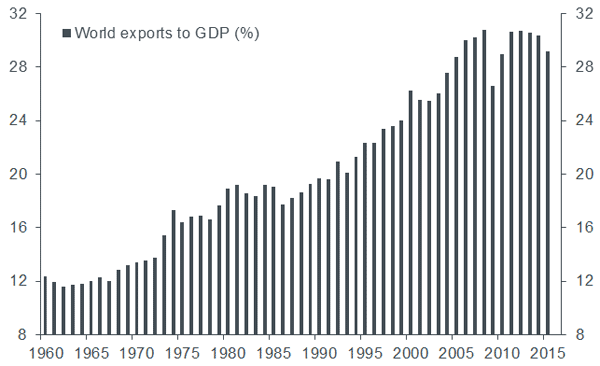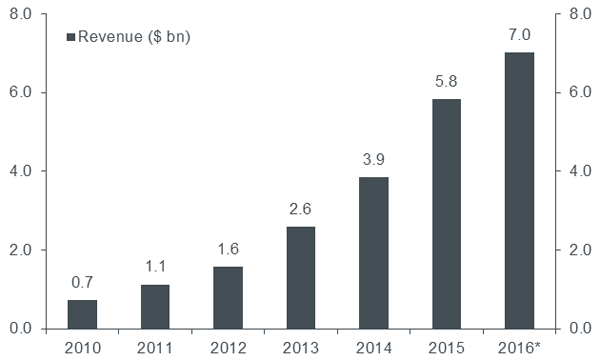Subscribe
Sign up for timely perspectives delivered to your inbox.
Throughout the 20th century, the world economy became more global than ever before. Cross-border trade grew exponentially and the increasingly free movement of people led to the blurring of international boundaries, both geographical and cultural.
While there is little doubt that trade-liberalisation and the reduction in global protectionism laid the foundations for the surge in global trade, technology was arguably the catalyst behind the formation of the globalised economy as we know it today. It is hard to imagine the current world of global supply chains and multi-national conglomerates without the revolutions in transport, communications and information-sharing technology that characterised the period.
However, in recent years these trends have begun to stagnate. Global exports as a proportion of output are back to 2005 levels (see figure 1) and in one of the great ironies of modern economics, technological progress, the force that enabled the globalisation of the world economy, is now driving its downfall.
Figure 1: Global exports have stalled since 2005
[caption id=”attachment_72548″ align=”alignnone” width=”600″] Source: World Bank, Henderson, November 2016.[/caption]
Source: World Bank, Henderson, November 2016.[/caption]
One of the key ways in which technology is reshaping the global economy is by facilitating the increasing dominance of ideas over physical products. The basic premise is similar to that encapsulated by Larry Summers in his work on secular stagnation. While the consumer-oriented companies of the 1980s and 1990s had to spend decades establishing an extensive global supply chain, their modern counterparts can achieve phenomenal success with little need to venture beyond the walls of their offices. 21st century enterprises possess the ability to create enormous value with relatively few material inputs.
Facebook provides a simple example. With a laptop and an internet connection, Mark Zuckerberg was able to lay the foundations for a $300bn multi-national corporation. The speed with which Facebook was able to grow with little or no global interaction is astounding. The company produced revenues of over $1bn for the first time in 2011, less than eight years after it was founded. Five years later revenues have grown to over $7bn (see figure 2).
Figure 2: Facebook growth – no global supply chain required
[caption id=”attachment_72526″ align=”alignnone” width=”600″] Source: Bloomberg, Henderson, November 2016. Notes: *2016 number is to Q3 2016.[/caption]
Source: Bloomberg, Henderson, November 2016. Notes: *2016 number is to Q3 2016.[/caption]
The implications for the globalised world economy are profound. The need for a vast global manufacturing network is diminishing and the real value-add in the production process has shifted from sourcing the lowest cost, most efficient manufacturing method to the intellectual property that differentiates modern services from their competitors. Even large scale consumer goods with a global manufacturing presence such as the Apple iPhone get the majority of their value through the operating systems that are created in Palo Alto, California.
This technologically-driven shift in corporate strategy has been a major contributor to the stagnation in international trade, the most basic form of globalisation. Trade provides an important stepping stone in the path towards economic development for many nations, so the fallout is likely to have a disproportionate effect on emerging economies. Where once the simplest path to increasing living standards was to work your way up the supply chain, education and skills will become much more important.
Nevertheless, such disruptive forces can often create opportunities. For emerging nations with favourable demographics it provides a chance to leverage a young and increasingly well-educated workforce. For example, in India there has been a shift away from the provision of low-cost manufacturing towards higher value-add services roles such as call centres.
Another way in which technology is loosening the grip of globalisation is through its impact on the manufacturing process itself. While the gradual shift in consumption from goods to services (see figure 3) has reduced manufacturing’s relative share of the global economy, technology is also beginning to dilute its global nature.
Figure 3: Goods and services as a proportion of US personal expenditure (%)
[caption id=”” align=”alignnone” width=”600″] Source: Datastream, Henderson, November 2016.[/caption]
Source: Datastream, Henderson, November 2016.[/caption]
In the post-war period, innovations in transport and communications gave firms in advanced economies increasing access to the lower wages and rents of emerging nations. Firms that required mass-produced products on tight profit margins could offshore their manufacturing capabilities, bypassing expensive and heavily-unionised domestic manufacturing plants. In return, emerging economies received inward investment and the ability to access developed technologies.
Of late, developments in automation technology and a greater focus on more complex elements of the manufacturing process have begun to reduce the attractiveness of offshoring. Firms are able to supplement a small number of domestic workers with automated forms of robotics to achieve increasingly cheap and efficient outcomes without the bureaucracy or political pressure of offshoring. The rapid decline in the price of robotics relative to foreign labour is allowing firms to produce products domestically for a similar cost. Analysts predict that such ‘reshoring’ will be a pertinent theme in the global economy over coming decades, weakening another link in the global supply chain.
Whether factories are located abroad or domestically will be irrelevant if they are no longer required at all. While we are still some way off a post-factory era, the widespread growth of 3D printers (able to form a three-dimensional object with the use of successive layers of material under computer control) is slowly reducing our dependence on global manufacturing. Just as companies such as Netflix and Uber have revolutionised the way we consume basic services such as entertainment and transport, 3D printing has the potential to transform the way we purchase consumer goods. What is common in both cases is the absence of international trade in the transaction.
Moreover, increasingly sophisticated virtual and augmented reality technologies mean that even global tourism is not immune from the march of technology. In a recurring theme, if installation rates of 3D printers and virtual reality continue their current trends, then the developed markets will once more be the major beneficiaries.
There are multiple facets to globalisation, many of which lie outside the realms of international trade. In its broadest terms globalisation embodies the increasingly intertwined nature of global social and cultural forces. As we have seen frequently in recent months, there is a belief among many in public life that globalisation is eroding national identity. Even in this abstract area, there is evidence that technology is driving change.
 While innovation is typically viewed as a structural force acting on globalisation in the long-term, it also has the ability to influence the shorter, more cyclical factors. Specifically, a compelling argument can be made that the current rise in protectionist and anti-globalisation sentiment has been catalysed by recent technologies. Indeed, the impact of technology and globalisation on the outcome of the 2016 US election was explicitly acknowledged by Barack Obama in one of his final speeches as President of the United States. He suggested that globalisation combined with technology and social media has disrupted people’s lives, making their national identity less certain.
While innovation is typically viewed as a structural force acting on globalisation in the long-term, it also has the ability to influence the shorter, more cyclical factors. Specifically, a compelling argument can be made that the current rise in protectionist and anti-globalisation sentiment has been catalysed by recent technologies. Indeed, the impact of technology and globalisation on the outcome of the 2016 US election was explicitly acknowledged by Barack Obama in one of his final speeches as President of the United States. He suggested that globalisation combined with technology and social media has disrupted people’s lives, making their national identity less certain.
There are three ways that technology has helped drive anti-globalisation politics:
It is clear that technology will continue to have wide-reaching implications for the globalised economy as we know it today. Global manufacturing and supply chains are becoming less relevant in a world of ideas and the key drivers of offshoring are dwindling. Furthermore, technology’s impact on inequality and the advent of social media are driving a new generation of anti-globalisation politicians and protectionist trade policy.
However, while innovation is occurring at an exponential pace, the forces of technology that are acting on globalisation are relatively slow moving. Corporates continue to need offshore manufacturing expertise and consumers are unlikely to be printing toothbrushes en masse in the near future. So while powerful change is underway, it is more of a gradual progression than a sudden retreat into isolation.
Notwithstanding this, its potential impact should not be underestimated. If emerging markets are no longer the centres of industrial production then standard macroeconomic frameworks may cease to apply. Rather than Korea being a bellwether indicator of global production, investors may prefer to watch San Francisco or London. Further, traditional measures of economic output such as GDP become almost meaningless in a world of intangibles and idea-centric companies become increasingly hard to value.
Ultimately, technological progress should be a force for good, raising living standards globally as the world economy continues to become more dynamic and efficient. Such an outcome would be positive for investors, even if the world becomes a little less global in the process.